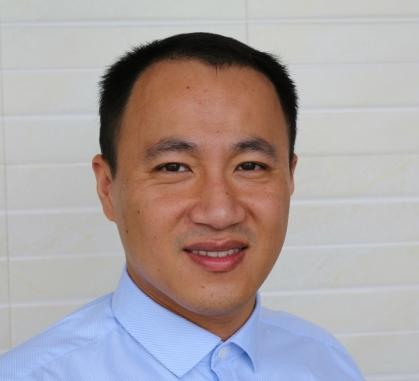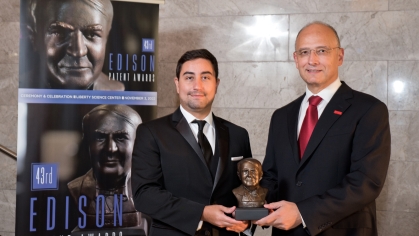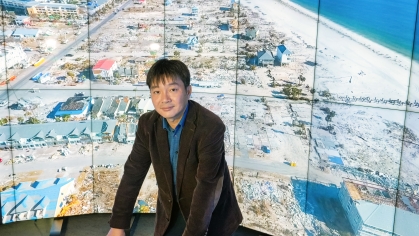NSF Grant Supports CBE Professor’s Collaborative Research on Closed-loop Control of Microbial Communities

Haoran Zhang, an associate professor in the School of Engineering’s Department of Chemical and Biochemical Engineering (CBE) has received a four-year $949,877 award from the National Science Foundation (NSF) to integrate optogenetics and metabolic biosensing for closed-loop control of microbial communities.
This is a collaborative project between Rutgers and Princeton University, which submitted the same proposal and received equal funding from the NSF.
Zhang is excited by the opportunities afforded by the grant. “It opens up new opportunities to further explore my research interests in synthetic biology and metabolic engineering,” he says, “and generate new knowledge and insights to unleash the potential of metabolite sensing to facilitate microbial communities.”
CBE department chair and professor Helen Buettner notes that “The novel biosensing approach Professor Zhang applies in this work is a wonderful example of the ground-breaking biomanufacturing and biotechnology research we are conducting in the CBE department.”
A First-of-its-Kind Control System
There would be little scientific progress in areas ranging from biomanufacturing and biomedical research to food production and renewable energy without biotechnology innovations.

Research regarding the potential use of synthetic microbial communities that are selected and grown together by researchers is currently hampered by a lack of reliable controls over the communities. To gain closed-loop control over synthetic microbial communities of model bacterium E. coli and brewer’s yeast S. cerevisiae, the project will integrate metabolite biosensors and optogenetic growth control systems.
By using light, Zhang states that “optogenetics will modulate the growth of community members and adjust its population composition. Metabolite biosensing will provide instant feedback on the metabolic state of microbial communities to inform optogenetic actuators – and thus establish closed-loop feedback control systems.”
Enhancing the Production of Chemicals
Ultimately, according to Zhang, these pioneering control systems will test different microbial communities’ ability to enhance their production of desired commodity and specialty chemicals with different biosynthesis pathways.
“Synthetic biology and metabolic engineering tools are used to integrate a desired function – such as biosynthesis of a desired product – into the recruited microbial communities,” he explains.
He adds, however, that “No matter what products are produced, the most critical project goal is to integrate the metabolite and light sensors to modulate the interaction of the community microbes to improve biosynthesis performance.”
According to Zhang, the project’s goals will be met by generating new knowledge and methods to control synthetic microbial communities – and their production of important chemicals. “More broadly, it will help us gain a fundamental understanding of complex behaviors in these communities.”
Sharing New Knowledge with Tomorrow’s Bioengineers
The project will also support Zhang’s engagement with broad educational activities for high school, undergraduate, and graduate student bioengineers.
“We’ll be offering hands-on research opportunities for students to participate in frontier scientific research in my lab,” he says. The students will also be trained in developing data analysis, research presentation, and report writing skills.
Additionally, the project will seek to engage students from historically underrepresented groups in STEM education.


